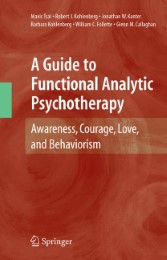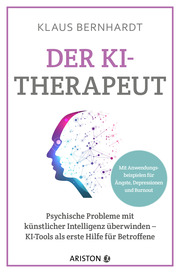A Guide to Functional Analytic Psychotherapy (E-Book, PDF)
A Guide to Functional Analytic Psychotherapy
eBook - Awareness, Courage, Love, and Behaviorism
Bibliographische Informationen
Format: Digitale Rechteverwaltung: Digitales Wasserzeichen
Beschreibung
For more than two decades, Functional Analytic Psychotherapy has brought new meaning and new meaningfulness to client/therapist relationships. And clients with disorders as varied as depression, PTSD, and fibromyalgia have benefited from its nuanced, curative power. In A Guide to Functional Analytic Psychotherapy, originators Robert Kohlenberg and Mavis Tsai join with other FAP practitioners to present a clinical framework, addressing points of convergence and divergence with other behavior therapies. Tracing FAPs emerging evidence base, it takes readers through the deep complexities and possibilities of the therapeutic bond. And the attention to mindfulness and the self makes maximum clinical use of the uniqueness of every client and every therapist.
Autorenportrait
Robert J. Kohlenberg, Ph.D., ABPP, is a professor of psychology at the University of Washington where he was the Director of Clinical Training from 1997 - 2004. The WA State Psychological Assoc. honored him with a Distinguished Psychology Award in 1999. He has presented "Master Clinician" and "World Round" sessions at the Association for the Advancement of Behavior Therapy and has published papers on migraine, OCD, depression, intimacy of the therapeutic relationship, and a FAP approach to understanding the self. He has presented FAP workshops both in the US and internationally. He has received research grants for FAP treatment development, and his current interests are identifying the elements of effective psychotherapy, the integration of psychotherapies, and the treatment of co-morbidity. He and Dr. Tsai are co-authors of Functional Analytic Psychotherapy: A guide for creating intense and curative therapeutic relationships. New York: Plenum. (1991).
Mavis Tsai, Ph.D., is a psychologist in independent practice and a clinical instructor at the University of Washington where she is involved in supervision and research. The list of publications and presentations by Dr. Tsai indicates the breadth of her expertise and includes work on healing PTSD interpersonal trauma with FAP, disorders of the self, power issues in marital therapy, incorporating Eastern wisdom into psychotherapy, racism and minority groups, teaching kids to be peace activists, and women's empowerment via reclaiming purpose and passion. She has led numerous workshops nationally and internationally and is known for her engaging interpersonal style as well as her behaviorally informed multi-modal approach to healing and growth that integrates mind, body, emotions, and spirit.
Jonathan W. Kanter, Ph. D., is an assistant professor at the University of Wisconsin, Milwaukee where he also serves as the Director of the Depression Treatment Specialty Clinic and the Coordinator of the Psychology Clinic. Dr. Kanters research is dedicated to improving the understanding of depression, improving psychotherapy for depression, and reducing the stigma associated with depression through treatment outcome research, detailed investigations of therapy processes, and other research activities using clinical and non-clinical populations. In April of 2006, Dr. Kanter received a Research Growth Initiative Award from UWM for a project entitled "Behavioral Activation Treatment for Depression in Latino Adults: A Pilot Study."
Barbara Kohlenberg, Ph.D., is an associate professor at the University of Nevada School of Medicine, Department of Psychiatry and Behavioral Sciences. She has a special interest in combining FAP and Acceptance and Commitment Therapy. She has been principal investigator and a co-investigator on NIH grants focused on treatment development using FAP and ACT, in the areas of addictions, stigma, and burnout. Her interests include FAP, ACT, and the elements of successful psychotherapy. She also is interested in training interviewing skills to medical students for use in medical settings.William C. Follette, Ph.D., is a professor of psychology at the University of Nevada, Reno. He has been an invited speaker on several occasions including keynote speaker on the "Problems and promise of empirically supported treatments" at the 1998 Spinal Cord Rehabilitation National Conference. He was also the invited lecturer on "Innovations in Psychotherapy Outcome Research Methodology" for the 1999 Allen L. Edwards Lecture Series at the University of Washington. Dr. Follette continues to research and publish in the areas of psychotherapy outcome research, behavioral research methodology, and clinical behavior analysis.
Glenn M. Callaghan, Ph.D., is an APA accredited Clinical Psychologist who serves as a professor of Psychology at San Jose State University. Dr. Callaghan is also the Director of Clinical Training at his institution. He maintains several lines of research including the examination of psychotherapy processes and outcomes in interpersonal psychotherapy, specifically, Functional Analytic Psychotherapy, research developing alternative approaches to nosological and nomothetic assessment of psychopathology, specifically, the Functional Idiographic Assessment Template, and research on direct to consumer marketing of psychotropic medications and the accuracy of self-diagnosing and appropriate medication seeking by viewers of drug advertisements. The work of Dr. Callaghan has been published in a number of journals.
Inhalt
E-Book Informationen
„eBooks“ sind digitale Bücher. Um eBooks lesen zu können, wird entweder eine spezielle Software für Computer, Tablets und Smartphones oder ein eBook-Reader benötigt. Da es eBooks in unterschieldichen Formaten gibt, gilt es, folgendes zu beachten.
Von uns werden digitale Bücher in drei Formaten ausgeliefert. Die Formate sind EPUB mit DRM (Digital Rights Management), EPUB ohne DRM und PDF. Bei den Formaten PDF und EPUB ohne DRM müssen Sie lediglich prüfen, ob Ihr eBook-Reader kompatibel ist. Wenn ein Format mit DRM genutzt wird, besteht zusätzlich die Notwendigkeit, dass Sie einen kostenlosen Adobe® Digital Editions Account besitzen. Wenn Sie ein eBook, das Adobe® Digital Editions benötigt, herunterladen, erhalten Sie eine ASCM-Datei, die zu Digital Editions hinzugefügt und mit Ihrem Account verknüpft werden muss. Einige eBook-Reader (zum Beispiel PocketBook Touch) unterstützen auch das direkte Eingeben der Login-Daten des Adobe Accounts – somit können diese ASCM-Dateien direkt auf das betreffende Gerät kopiert werden.
Da eBooks nur für eine begrenzte Zeit – in der Regel 6 Monate – herunterladbar sind, sollten Sie stets eine Sicherheitskopie auf einem Dauerspeicher (Festplatte, USB-Stick oder CD) anlegen. Außerdem ist die Anzahl der Downloads auf maximal 5 begrenzt.
Weitere Artikel aus der Kategorie "Psychologie/Angewandte Psychologie"
Neuerscheinung

Derzeit nicht verfügbar

im Buchladen vorrätig

Vergriffen






